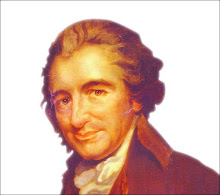A respected journalist and author inquired recently about the first meeting and introduction of Thomas Paine to Benjamin Franklin. There is indeed a bit of confusion and opacity among some historians and biographers of Paine on this issue. With some important exceptions, the uncertainty has been perpetuated by Paine's biographers. A few examples may serve to illustrate the whole. Moncure Daniel Conway's influential biography alluded to Paine's friendship with Oliver Goldsmith at the time of his introduction to Franklin -- perhaps contributing to the oft-repeated and incorrect assumption that it was Goldsmith who introduced them -- but seems otherwise unaware of how it came about. Samuel Edwards perpetuated the Goldsmith error in his Rebel! A Life of Thomas Paine. David Powell belabored the same erroneous point in his Tom Paine: The Greatest Exile. The infamous and slanderous attack-biography of James Cheetham makes no mention of how Paine and Franklin met. In the still widely circulated Thomas Paine: America's Godfather, biographer W. E. Woodward made no mention. He simply wrote that Paine called on Franklin from time to time in London during 1773-1774. John Keane's otherwise exhaustive -- though somewhat flawed -- biography overlooked how the introduction came about. More recently, an article "The Sharpened Quill" in THE NEW YORKER 10-16-2006 by Harvard professor Jill Lepore states that Paine "once caught Franklin's eye during a chance meeting in London." Prof. Lepore's observation was in accordance with the online History.org website that attributes their meeting to "happenstance." (The author has written the history.org website with the correction). To be fair, the list of scholars who got it right includes David Freeman Hawke, Alfred Owen Aldridge, A. J. Ayer, Jack Fruchtman, Harvey J. Kaye, Vikki Vickers and others; but with the exception of Harvey J. Kaye's work, most have had little exposure in other than academic circles.
The mystery of how Thomas Paine met Benjamin Franklin is no mystery. Paine recounted the circumstances in a letter to his friend and political ally Henry Laurens of South Carolina, second president of the Second Continental Congress and president at the ratification of the first constitution.
"As I always had a taste for science, I naturally had friends of that cast in England; and among the rest George Lewis Scott, Esq., through whose formal introduction my first acquaintance with Dr. Franklin commenced. I esteem Mr. Scott as one of the most amiable characters I know of, but his particular situation had been that in the minority of the present King he was his sub-preceptor, and from the occasional traditionary accounts yet remaining in the family of Mr. Scott, I obtained the true character of the present King from his childhood upwards, and, you may naturally suppose, of the present ministry."
"To the Honorable Henry Laurens. Philadelphia. January, 14 1779" in Philip Foner, ed., Complete Writings of Thomas Paine (New York: The Citadel Press, 1945), 2:1162.
Saturday, March 16, 2013
Subscribe to:
Post Comments (Atom)




I have also come to see the possibility that as their friendship matured, Franklin recruited Paine to take to North America messages to leaders of the colonial resistance that Franklin could not, with safety, otherwise transmit. Franklin obviously trusted Paine enough to provide him with letters of introduction. This assignment might also account for Paine traveling as a first class passenger and for his care upon arrival in New York. I have found nothing in the writings of either Franklin or Paine to substantiate this; however, given the risk of arrest facing Franklin while he remained in London, Paine seems a likely candidate to play the role of courier.
ReplyDeleteVery insightful, Ed. Franklin was a foxy fellow. Your thought makes perfect sense. Warm thanks for your comment.
ReplyDeleteNicely done!
ReplyDelete